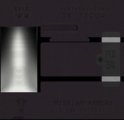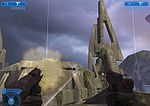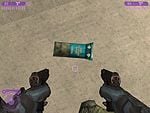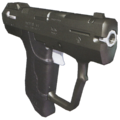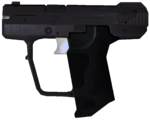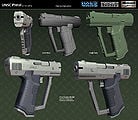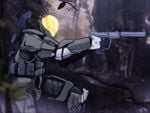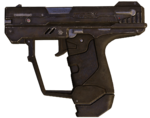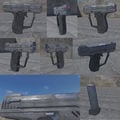M6C magnum: Difference between revisions
From Halopedia, the Halo wiki
BaconShelf (talk | contribs) |
|||
| Line 34: | Line 34: | ||
===Advantages=== | ===Advantages=== | ||
The M6C PDWS is a defensive sidearm allowing for successful engagement at close range. The M6C Magnum's 12.7mm ammunition does a considerable amount of damage against flesh based infantry; the large caliber bullet, along with its cartridge size, yields a large amount of kinetic energy; coupled with its high rate of fire and its semi-armor-piercing ability makes the M6C a choice sidearm against unshielded infantry over short distances. | The M6C PDWS is a defensive sidearm allowing for a successful engagement at close range. The M6C Magnum's 12.7mm ammunition does a considerable amount of damage against flesh based infantry; the large caliber bullet, along with its cartridge size, yields a large amount of kinetic energy; coupled with its high rate of fire, low accuracy, and its semi-armor-piercing ability makes the M6C a choice sidearm against unshielded infantry over short distances. | ||
===Disadvantages=== | ===Disadvantages=== | ||
Revision as of 12:01, April 15, 2019
The M6C Personal Defense Weapon System,[1] otherwise known as the M6C Magnum Sidearm, is a United Nations Space Command sidearm. It is a variant of Misriah Armory's M6 handgun series.
Design Details
The M6C Magnum Sidearm is a short-medium range UNSC handgun that was distributed to members of the UNSC Marine Corps, particularly members of vehicular crews. This model has been up-sized to be used by Spartans in MJOLNIR armor. Even though the Spartan issue pistols are larger than the standard-issue variants (~117%) they can still share magazines. The M6C is a semi-automatic, recoil-operated, magazine-fed handgun. It has DA, or double-action only trigger and fires the M228 12.7×40mm SAP-HP round (Semi-Armor Piercing, High Penetration) from a 12-round magazine. It has a considerably high rate of fire (6 rounds/sec or 360 rounds/min) with a limited maximum effective range, being able to hit a target accurately at only about 20 meters. The M6C is considered to be the weaker of the currently usable M6-series models in that it has reduced accuracy, a shorter effective range, and lower efficiency rate against shielded, armored, and soft targets.
The M6C uses the short recoil principle. Because it is semi-automatic, the gun will cock itself after every shot due to recoil and will continue to do so until the magazine is empty. The recoil comes from the gases of the rounds fired. The gases force the slide, located on the top of the gun, backward. The slide goes all the way to the rear, absorbing the force of the gases and bringing the spent casing with it via the extractor. Once the ejection port is completely opened, the ejector throws the spent casing out of the weapon. Of course, before the first round can be fired, the round must be chambered. This is done first by inserting a magazine with ammunition into the grip of the weapon and second by pulling the slide back completely and letting it launch forward, chambering a round on the way. When the round is chambered, the extractor goes over the rim of the cartridge casing, allowing for positive extraction upon firing. There is a small, red rectangular box on the flat back of the slide that protrudes slightly when the weapon is cocked. Once this is done, the safety, located at the back of the slide on both sides, must be switched off or the weapon will not fire. Once all the rounds have been spent, the slide catch, a rectangular lever located above the trigger, is forced upward and “catches” the slide by a little notch. To reload, the empty magazine must be removed. This is done by using the magazine release button which is located on the grip. Once the empty mag is out, a fresh one can be inserted. Once the fresh mag is inserted, the slide catch is pressed downward and the slide chambers a round.
Ammunition
The M6C Magnum, uses 12.7×40mm (.50 caliber) Semi-Armor-Piercing, High-Penetration rounds.[2] These rounds have a jacket of copper or nickel which encloses a more frangible metal projectile that will deform shortly after penetration. When the round hits a hard object such as body armor, the jacket will temporarily help maintain the shape of the projectile so that it has a better chance of penetration. A second impact against bone or solid muscle mass inside the target's body is usually enough to complete the jacket's rupture, at which point the projectile mushrooms and fragments into smaller pieces, causing a large number of wound channels and maximizing damage. These rounds are typically more effective against infantry as opposed to armor-piercing rounds due to a larger dump of KE, resulting in a better terminal ballistic profile, and also to the process described above, with an armor-piercing round speeding through the target's body without causing as much trauma, creating a scenario where a wounded enemy can still be an effective combatant until they bleed out. Ammunition packets for the M6C Magnum are labeled in the same blue color as all other M6 sidearm ammunition packs. However each ammunition pack has a different shade and text to denote the type of ammunition used.
Advantages
The M6C PDWS is a defensive sidearm allowing for a successful engagement at close range. The M6C Magnum's 12.7mm ammunition does a considerable amount of damage against flesh based infantry; the large caliber bullet, along with its cartridge size, yields a large amount of kinetic energy; coupled with its high rate of fire, low accuracy, and its semi-armor-piercing ability makes the M6C a choice sidearm against unshielded infantry over short distances.
Disadvantages
The M6C PDWS, when compared to the strength of other versions of the M6 Magnum series, is considered the weaker of the military issued sidearms. Its inability to engage infantry at medium or long ranges is the weapons main disadvantage; for this reason the M6C is mostly issued to vehicular crews as the weapons nature serves a more passive defensive role. The weapon’s accuracy when compared to the other M6 models, is about 1/5 as accurate as the M6D PDWS, having a large shot spread at close ranges. This, combined with its minimal damage against current shield systems, makes it a poor weapon of choice when used in offensive situations. The M6C's default ammunition has no secondary effects, limiting its effectiveness against heavily armored infantry.
Influences
One possible influence on the design of the weapon is the Walther P99.
Changes from the M6D PDWS in Halo: Combat Evolved
- The M6C has a much faster fire rate, but far less stopping power.
- Lacks a targeting scope.
- Takes 13 headshots to kill rather than 3.
Changes from Halo 2 to Halo 2: Anniversary
- Takes 11 headshots to kill rather than 13 in multiplayer.
Trivia

|
See our gameplay information related to M6C magnum on its gameplay page. |

|
Browse more images in this article's gallery page. |
- The Halo 2 Post Game Carnage Report Breakdown Tab on Bungie.net erroneously lists the weapon as the "Magnum M6G Pistol".
- The M6Cs bears a remarkable resemblance to the Walther P99 pistol, though the latter handgun is much smaller than the former.
Gallery
A texture of the M6C showing the engravings on the slide. Note the Korean hangul, 일곱, meaning seven.
An in-game profile view of the M6C Magnum Pistol in Halo 2.
Sergeant John Forge aiming an M6C in Halo Wars.
The M6C Magnum Pistol as it appears in Halo Legends: Homecoming.
Jonah-B283 using a silenced M6C in Headhunters
- H2A - M6C concepts.jpg
Several different concepts for the M6C in Halo 2: Anniversary.
Jerome-092 firing an M6C at Atriox in Halo Wars 2.
List of appearances
- Halo: The Flood
- Halo 2 (First appearance)
- Halo Wars
- Halo: Helljumpers
- Halo Legends
- Halo: Evolutions - Essential Tales of the Halo Universe
- Halo: Nightfall (Hologram only)
- Halo 2: Anniversary
- Halo Mythos
- Halo Wars 2
- Halo: Retribution
- Halo: Silent Storm
Sources
- ^ Bungie.net: ODST Guide
- ^ Halo 2 Manual
| |||||||||||||||||||
